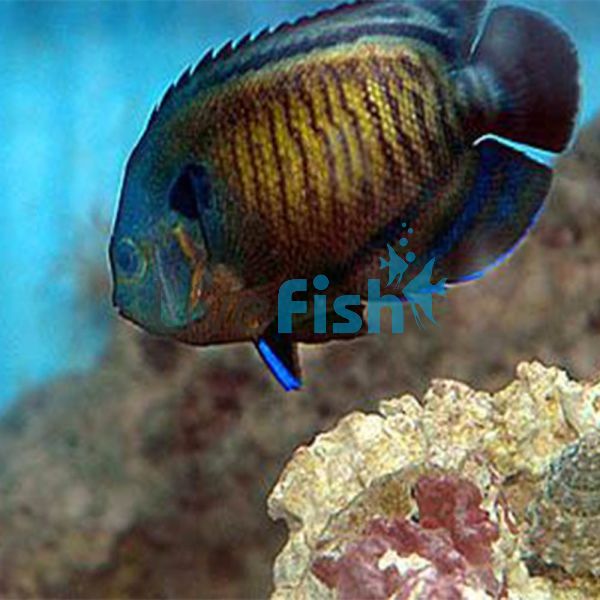Dusky Angelfish - Medium
The Dusky Angelfish is an understated beauty. It has a subtle combination of exquisite dark patterns and colourful highlights. This fish will make a great addition to any aquarium.
The Dusky Angelfish has body colour that ranges from dark brown to golden brown. Dark, vertical bars run down the body and along the dorsal, caudal, and anal fins. The spines of the dorsal fin, as well as the caudal and anal fins, are ringed with vivid blue stripes. The head is a blueish brown colour, with brown or yellow bands that connect above the nose around the eyes. Above the gills is a black spot with blue edging, and sometimes a brown or yellow line is also present.
This species is a protogynous hermaphrodite, that can switch from female to male. When there isn't a male available, a female will transform into one. They can also transition from male to female, but this process takes longer. Centropyges are unsexed at birth but start adulthood as females. In a social group, the larger, more dominant female will be the one that changes sex. Angelfish are known to reproduce in large groups at dusk. They perform a ritual dance and swim up into the water column near the surface to discharge eggs and sperm.
This species is found in the Indian Ocean's northern and western regions. It may be found along Africa's eastern coast, in the Red Sea. It is also distributed across the Indian Ocean as far as Thailand and Sumatra. Dusky Angelfish can be found over rubble regions near coral reefs. They also inhabit lagoons and outer reefs between depths of 1-30 metres.
Tank Recommendations for the Dusky Angelfish
Aquarium size for the Dusky Angelfish should be at least 70 gallons (318 litres) capacity.
A good setting will include several hiding spots and live rock for grazing. The Dusky Angelfish will be more aggressive in a smaller setting. It may be unsuitable for a reef tank as it often likes nipping at sessile invertebrates.
A well-established aquarium is preferable, as it will be able to graze on algae inbetween being fed. This is an active species that benefits from large open swimming areas in the tank.
Suitable Tank Buddies
The Dusky Angelfish has a semi-aggressive temperament. It may show aggression other dwarf Angels and member of the Centropyge genus.
A tank that is too small will increase agression in this species. Using a larger tank will also lessen the risk of it nipping at sessile invertebrates.
Usually Compatible
Suitable tank buddies include peaceful fish such as Clownfish, Gobies, and Blennies. It is best to introduce them before the Dusky Angelfish, as it may show aggression to new tank members.
Sometime Compatible
A tank needs to be suitably large if housing this species with other dwarf Angelfish. It is generally recommended to only have one in a tank. Caution is also advised with species such as Eels, Groupers, Triggerfish, and Wrasse. Sessile invertebrates may get nipped at, especially in a smaller tank.
Rarely Compatible
Avoid housing it with other members of the Centropyge Genus. Larger aggressive predators like Sharks and Rays are also unsuitable. Seahorses, Pipefish, and other slow movers are best kept in a separate tank.
Feeding Your Dusky Angelfish
This is an omnivorous species. It will eat Spirulina and other plant and vegetable materials, as well as marine algae. The meaty items it enjoys include mysis and frozen shrimp. A suitable diet should also contain high grade angelfish preparations. The Dusky Angelfish needs to be fed several times per day.
| Scientific Name | Centropyge Multispinis |
|---|---|
| Care Level | Moderate |
| Common Names | Dusky Angelfish, Bluefin Angelfish, Manyspined Angelfish, Dusky Cherub, Black Angelfish, Multispined Angelfish, Brown Pygmy Angelfish |
| Diet | Omnivore |
| Fish Family | Pomacanthidae |
| Lifespan (years) | 11 |
| Max. Length (cm) | 15 |
| Min. Tank Volume (l) | 318 |
| Origin | North & Western Indian Ocean; East Africa, the Red Sea, Thailand, Sumatra |
| Reef Safe | With Caution |
| Sociability | Semi-aggressive |
| Venomous | No |
| Water Conditions | 22.2-25.5° C (72-78° F), dKH 8-12, pH 8.1-8.4, sg 1.020-1.025 |




